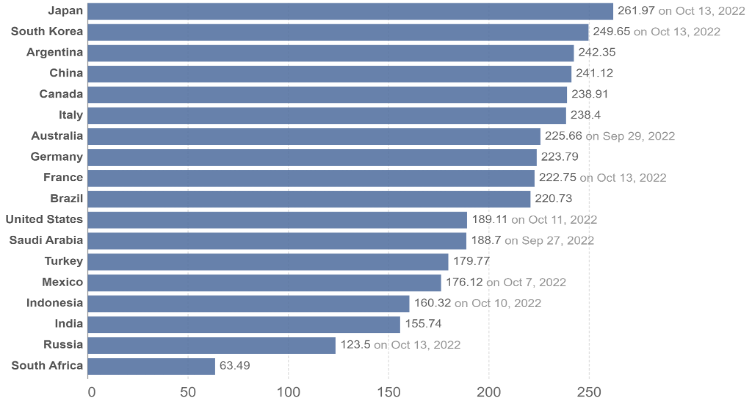With the Covid-19 pandemic bringing the entire world to an abrupt halt in 2020, multilateral groups such as the Group of Twenty (G20), the United Nations and the European Union played an essential role in coordinating efforts and ensuring that recovery initiatives were spread out across the globe, benefiting those nations that could not rise out of this turmoil without international support.
Arguably, vaccination against the virus causing the Covid-19 respiratory ailment was one of the most effective means to mitigate the effects of the pandemic in both developed and developing nations. With global networks and partnerships allowing a single dose of Covid-19 vaccine to be priced between US$2 and $40, governments needed to make inoculation available for all citizens.
The following data indicate how successful vaccine penetration was in G20 member nations.

However, the Global South evidently fell behind developed nations.
A death rate of 4.66% in Mexico was alarming, with Indonesia being at a concerning 2.46%. Poor mortality rates are a significant indicator of a nation’s sub-optimal health infrastructure.
This means that the developing countries of the G20 lagged behind their developed counterparts in terms of the quality of medical services available to their people, and the results are evident in the Covid-19 data made public.
Despite the vaccines’ apparent success in reducing the disease’s severity among vulnerable populations, numerous countries experienced the adverse effects of widely discredited measures like school closures and lockdowns.
These measures created a significant divide between the Global North and South, with certain nations benefiting from better health infrastructure and advanced educational facilities, allowing them to reopen earlier than others.
For instance, in 2020, children in advanced economies lost an average of 15 school days due to the pandemic, while the number increased to 45 days for emerging-market economies and a staggering 72 days for children in the poorest nations.
The Global South
India faced an uphill task due to its inherently large population, relatively small medical workforce and budgetary constraints. Mexico found it challenging to address an influx of immigrants in its southern regions, paired with geographical disparities.
Indonesia, despite being the first Southeast Asian country to commence a vaccine rollout, fell victim to its own low vaccine stocks and bureaucratic hurdles.
Japan found great success in its vaccination numbers due to a robust campaign, and additional efforts spurred on by the nation hosting the Tokyo Olympics. South Korea used tech solutions for evidence-based health targets and ramped up production through an inherent advanced medical sector.
Other developed G20 nations, similarly, had the privilege of abstaining from such problems for the most part. The United States, despite a strong domestic anti-vaccine movement, had crossed 180 vaccinations per 100 persons at one point, primarily due to governmental wealth enabling contracts with pharmaceutical giants, and vaccines to be administered for free.
The European Union also worked together to fund vaccine research and development and produced enough vaccines by July 2021 to vaccinate 70% of its adult population.
The G20 had, in this regard, attempted to bring about vaccine equity in multiple instances. It created the Access-to-Covid-19 Tools (ACT) Accelerator to bring about an equitable distribution of tests and, subsequently, vaccines around the globe. This was assisted by disseminating information and resources, often favouring nations with little or none to spare.
India’s G20 presidency
During its tenure as the president of the G20, the Indian government was deeply committed to driving tech-enabled development in the health sector and establishing digital public infrastructure.
One crucial proposal India and South Africa put forth in 2020 before the G20 was an intellectual property rights waiver. The primary goal was to enhance access to knowledge, making the battle against Covid-19 economically feasible for developing nations.
Despite not gaining significant traction at the time, this proposal resurfaced during India’s presidency due to its potential to address the pressing challenges faced by the health sectors in the global South.
Moreover, the collapse of COVAX, a global vaccine network intended to distribute vaccines equitably, clearly indicated the structural bottlenecks and vaccine politics that needed urgent resolution.
The existing mechanism failed to provide vaccines effectively based on the specific needs of individual countries, underscoring the importance of a comprehensive and united approach to global health crises.
As India’s G20 presidency approaches its conclusion, specific critical issues remain that demand immediate attention. The global value chains suffered disruption due to the pandemic, and the Russia-Ukraine dispute further highlighted the system’s vulnerability to external shocks.
India must recognize the opportunity to lead the coordination of the G20 in addressing these gaps and creating more robust health systems to mitigate future risks.
This article was co-authored with Rohan Ross of National Law School of India University in Bangalore, Karnataka, during his internship at the Observer Research Foundation.

